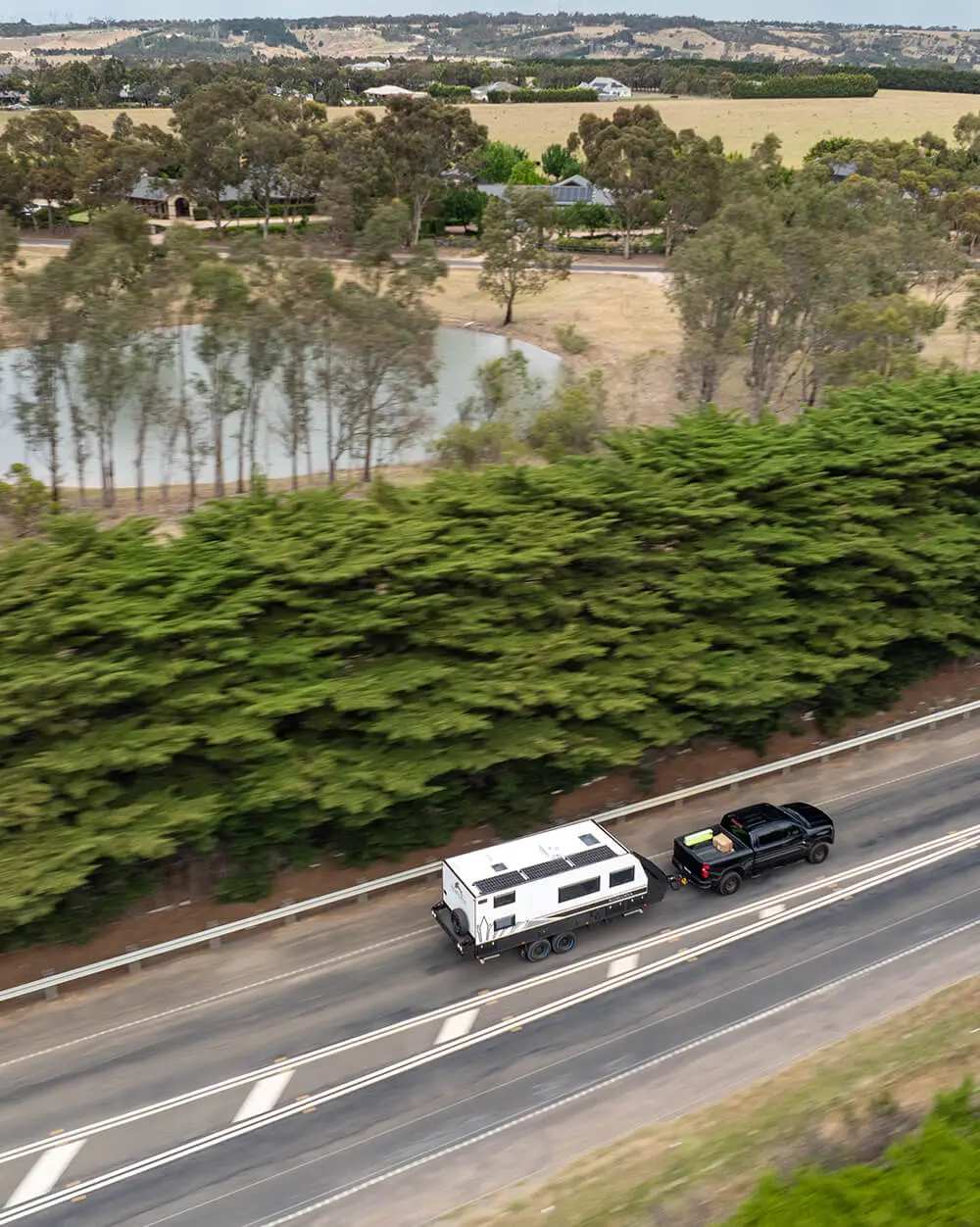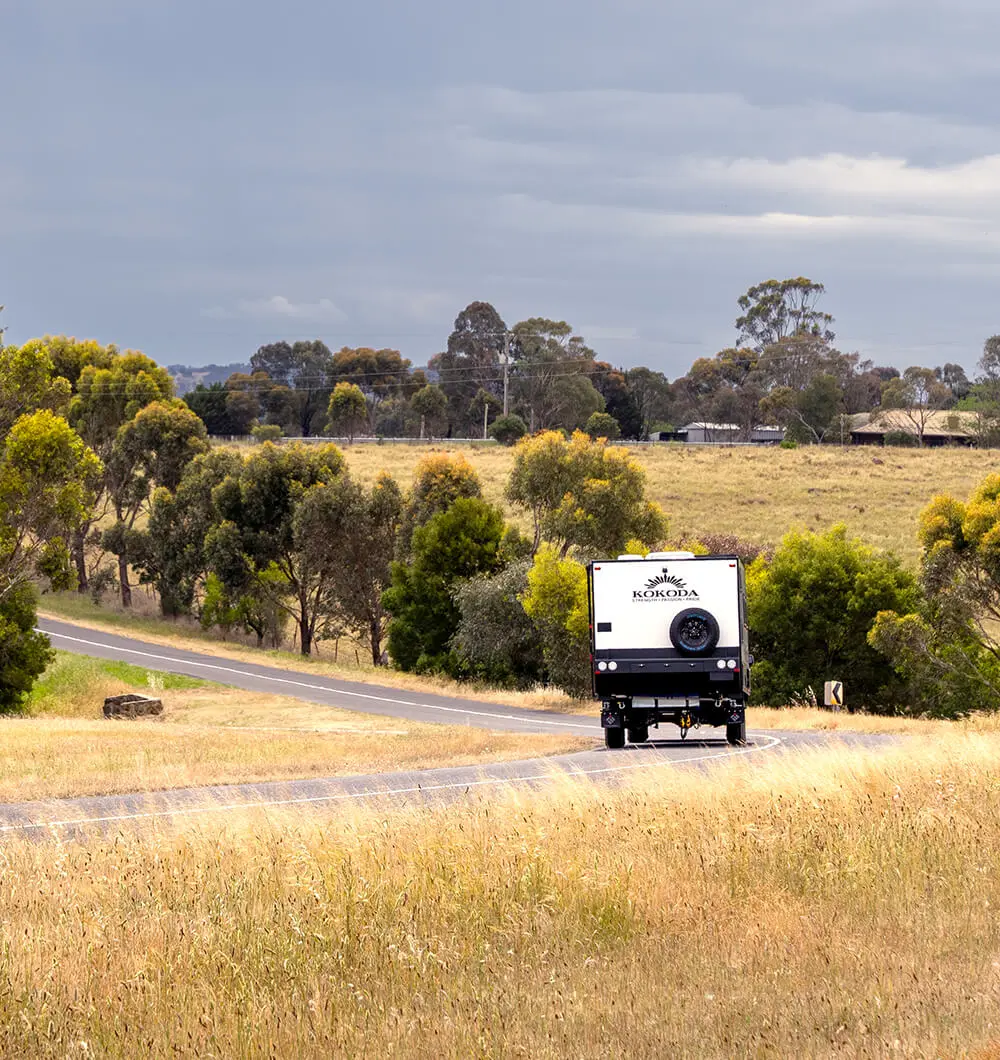useful tips
a few handy pointers to help you tow with confidence and keep things smooth on and off the road.
drive with confidence
Your vehicle will perform differently when you are towing a caravan.
Towing
On the Road: When overtaking, take it slow and swing wide—cutting corners while towing can cause trouble. If your caravan starts to sway, don’t slam the brakes. Stay calm, ease off the accelerator, and slow down smoothly to regain control.
When Parking: Take extra care when parking—your caravan is likely wider and taller than your car, which can make tight spots a bit tricky. Take your time, use your mirrors, and if you’ve got a spotter, even better.
view tow vehicle guide
Off-Road Travel
When travelling off-road your vehicle should not be taken for granted as remote area travelling will place additional stress and strain on the mechanical components. Remember that your items will bounce around inside whilst on the road. Storing food, plates, cups can be a headache so remember to pack smartly and where possible use items that can resist such elements. Other clever tips are to remove the turntable inside your microwave before travelling to avoid any accidents. If you have a tri-fold table always close it and strap together before you travel as rough roads can often cause it to crack or come away from the fittings. Remove all loose items and store away before travel.
Checks to Follow
We recommend the following checks as a minimum: Look for oil leaks from the engine, transmission, and shock absorbers. Check radiator coolant level. Check brake fluid level. Check battery terminals for tightness. Check battery fluid level. Check engine oil level. Check auto transmission oil level. If you have been travelling on rough corrugated roads check under the vehicle from time to time to make sure everything is in order. We also recommend keeping your door lock and hinges lubricated with light oil.
Speed and Tyre Deflation
We cannot express how crucial this is to off-road caravanning. For outback tracks and corrugations always reduce the tyre pressure and always reduce your speed. As a rule, your tyre pressures on the vehicle and van should be reduced to as low as 20psi and likewise your road speed should be reduced to less than 60kph, and sometimes as slow as 20kph.
Rough and severe corrugations have been known to cause shock absorbers to build up excessive heat. This can result in their failure. We advise frequent stops to allow your shock absorbers to cool down.


before you hit the road
A quick once-over goes a long way. Make sure your van’s good to go before you take off—so your trip starts smooth and stays that way.
Check Fluids
Carry out the following checks on oils and fluids;
- Engine Oil
- Transmission Oil
- Hydraulic Brake Fluid
Spare Parts
Carry the following vehicle spare parts checks;
- Belts
- Coolant hoses
- Fuel Line Hose
- Transmission hoses, hose clamps to suit the different sizes.
Water
Check water tank hoses for leaks, kinks and signs of wear and tear.
- Check hoses for mildew
- Check the clamps for tension
- Check for any signs of rust
From setting up camp to staying off-grid longer, these simple tips help you make the most of every trip—less stress, more adventure.
travel essentials
some items you should always have with you.
Cordless Drill
One of those must-haves on the road—perfect for quick setup, levelling, and all those little fixes along the way.
Torch
Always have a torch available especially when journeying off-road and into remote areas and remember to pack spare batteries.
Medical Kit
Whenever you travel packing a medical kit is a good idea.
Communications Equipment
When travelling into remote areas always be prepared for your phone network to let you down. We recommend VHF Radio for remote area communication to VKS 737 Network or other. A satellite phone is a great option also.
Fire Extinguisher and Fire Blanket
For obvious safety reasons we recommend always having an extinguisher close at hand.
Other Considerations
Please consider spare elbow and joiners for air suspension, extra fuses, an LPG regulator (optional), 7 or 12 pin plug and a 50 amp anderson plug.
We also recommend a spare set of wheel bearings.
Speed Limits
Please note that the normal open road speed limit is 100km/h unless sign posted otherwise.
South Australia, ACT, New South Wales, Queensland, and Victoria: Normal sign posted speed limits apply.
Tasmania: 90km/h when towing a caravan or trailer.
Western Australia: 100km/h when towing a caravan or trailer.
Northern Territory: Safe speed for prevailing conditions on the open road. Motorists should remember that in some cases motor vehicle manufacturers place speed restrictions on a vehicle when towing over a certain mass. Ford only permits 100km/h if the load is less than 1200kg. At 1600kg this drops to 90km/h. The speed further reduces until at 2300kg, 80km/h is the maximum. Holden takes a similar approach but also ties the vehicle speed to the type of towing equipment fitted. Spending a few minutes reading the trailer towing section in the owner's manual of your vehicle is highly recommended.
Batteries
It is crucial to get the maximum service life from your batteries.
There are specific methods of achieving maximum service life:
240 Volt Mains Power: this offers a constant power source
Vehicle Alternator: only effective when driving and will require the introduction of a BCDC Management System.
Solar Panels: they are sunlight dependent however they can offer a supplementary charge whilst driving.
Batteries use a large amount of their power when for example many items such as the fridge and LED lights are in use. On top of this, once night-time settles in and the solar panels (if applicable) are no longer running from the sun, they then switch to battery power to hold in the energy in order to function the next day. If you do not adequately re-charge the batteries they will come into great difficulty in running the van. Never flatten deep cycle batteries. Anything below 10.5 volts is considered dead flat. If the battery runs extremely low it may result in having to be industrially charged. It is important to monitor the life of your batteries and more importantly to check your charger regularly to ensure it is functioning properly.
For best battery performance check the level of the electrolyte frequently (if it's a wet cell battery) to ensure the plates are covered. The amount of use will depend on how frequently the battery will require topping up with distilled water.
Keep terminals clean. Dirty terminals will cause a drop in voltage supply. Keep the surface of the battery free from red dust. In WA for example the red dust contains iron and can cause the battery to short between terminals. Fully recharge the battery after use. When not being used; recharge the battery/s every month or two.
We also recommend cleaning your solar panels to ensure you are getting maximum efficiency from them.
Gas Cylinders: It is illegal to fill cylinders that are beyond their service life.
Hot Water System: Please read your manual very carefully before operating the hot water unit. Also we advise that you make yourselves fully aware of council warnings regarding the water supply in areas you visit. Some areas have higher levels of damaging components which can accelerate the deterioration of the unit. Remember to check the anode regularly and change when necessary to avoid any issues with the unit. Do not replace the anode with any non genuine accessory part as items such as these are not approved to be installed on branded products.
Tyre & Chassis
Caravan tyres are often forgotten or treated with indifference, you need to care for these as well.
Tyre Care
As your caravan ages and your tyres wear down make sure that they are not cracked, threadbare or showing any signs of damage.
Also remember to replace the spare whenever you replace the others. Always ensure you have a spare tyre. You should always check your caravan wheel nuts are correctly torqued before setting off. A good quality torque wrench will help you ensure that your wheels are fastened correctly.
Pressure Gauge
Caravan tyres often support a much greater weight than car tyres. If they are under-inflated they will create more friction on the road. Blowouts can be incredibly dangerous so check your tyre pressure often.
Tyre Inflating Pump
If your tyres are a bit under-inflated, an inflating pump is invaluable. Electric pumps can take the strain out of the job, but check that they are rated to the pressure of the caravan tyres.
Hex Handle
For putting down the corner steadies, check that it's long enough to reach your corner steadies as some can be situated in further from the edge of the caravan. The brace is designed to steady the van NOT level the van.
Chassis Care
With any dura-gal chassis stone chips and dents that are left exposed can accelerate oxidisation. Ensure that you keep your chassis maintained and re-spray or re-paint the exposed areas.